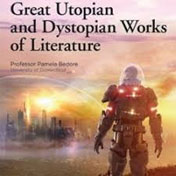 Great Utopian and Dystopian Works of Literature, Pamela Bedore, PhD, presenter, Great Courses, 2019.
Great Utopian and Dystopian Works of Literature, Pamela Bedore, PhD, presenter, Great Courses, 2019.
reviewed by Zeke Teflon
This is a mixed bag. There are 24 half-hour episodes covering many of the major utopian and dystopian works of the last half millennium, and Bedore does a good job of analyzing those running through the 1970s, at which point things go off the rails.
Just before that point, she rightly and insightfully devotes an episode to Ursula LeGuin (“The Dispossessed” and “The Left Hand of Darkness”), but then heads into the thicket of postmodernism and feminist/LGBTQ fiction to the exclusion of almost everything else except YA books (“Great Works of Literature”?) over the last 40 years. (Ironically, in an earlier episode dealing with Orwell, she approvingly quotes his famous essay, “Politics and English Language,” which posits that political writing should be as clear as “a pane of glass” — and then approvingly quotes postmodernist obscurantists such as Lyotard and Foucault in later episodes.)
In the latter episodes, Bedore skews things so badly that she devotes three full episodes to Octavia Butler — a quite good writer, but hardly deserving of a plurality of the post-1970s episodes — and completely ignores the deeply reactionary and thoroughly debunked assumption underlying what’s probably Butler’s most famous work, the Xenogenesis trilogy, treating those books as a flawed utopia. In fact, Bedore seems entirely oblivious to the entirely dystopic political and social associations and implications of Butler’s underlying assumption.
That assumption is that humans are basically competitive rather than cooperative, and hence are doomed to destroy themselves and the earth. This is merely the flip side of the Social Darwinist coin, and it’s no more progressive than that rationale for sociopathic behavior. (Butler doesn’t even provide a plausible way out of this artificial problem, leaving it up to more enlightened aliens to genetically alter humans to make them cooperative. To treat the Xenogenesis trilogy as a utopia is grotesque; it’s more akin to the disgusting, discredited “Lord of the Flies.”)
At any rate, Bedore wastes a lot of time on Butler, while ignoring or giving short shrift to more important writers, such as Margaret Atwood, Iain M. Banks, and (arguably) Ken Macleod, Boris and Arkady Strugatsky, Charles Stross, Rudy Rucker, and Kim Stanley Robinson. She devotes only a woefully superficial half-episode to Atwood’s masterful, extremely complex Maddaddam trilogy. And she totally ignores the premier utopian novels of the last four decades, Banks’ “Culture” novels.
As well, Bedore gives very short shrift to the important eco-catastrophe works of the last several decades. She doesn’t even mention the first, and probably best, climate-change-disaster novel, George Turner’s “Drowning Towers” (1987), which is a literary masterpiece, nor Norman Spinrad’s underrated, nearly ignored master work, “He Walked Among Us” (likely his best book but for, perhaps, “The Iron Dream”) and the only such novel she deals with at any length is Cormac McCarthy’s “The Road,” whose premise is so absurd (all life on earth extinguished except for humans) that the book should be dismissed out of hand. (Of course, McCarthy is an acclaimed “literary” author, so, at least in academic eyes, he deserves to be taken seriously — as should the postmodernist b.s. artists.)
All in all, Bedore does a good job with the pre-1980 period, but after that, not so much. Of course, the farther back you go the easier it is to make accurate critical judgments, but even so she did a poor job with the post-1970s material.
Great Utopian and Dystopian Works of Literature isn’t terrible. But it could have been so much better.
* * *
Zeke Teflon is the author of Free Radicals: A Novel of Utopia and Dystopia (large pdf sample here). His latest book is the compilation Godless: 150 Years of Disbelief, published by PM Press, and when the insomnia let’s up and he’s relatively coherent, Zeke is working on the sequel to Free Radicals, an unrelated sci-fi novel, a nonfiction book on the seamier sides of Christianity, and an anarchist compilation for PM.










